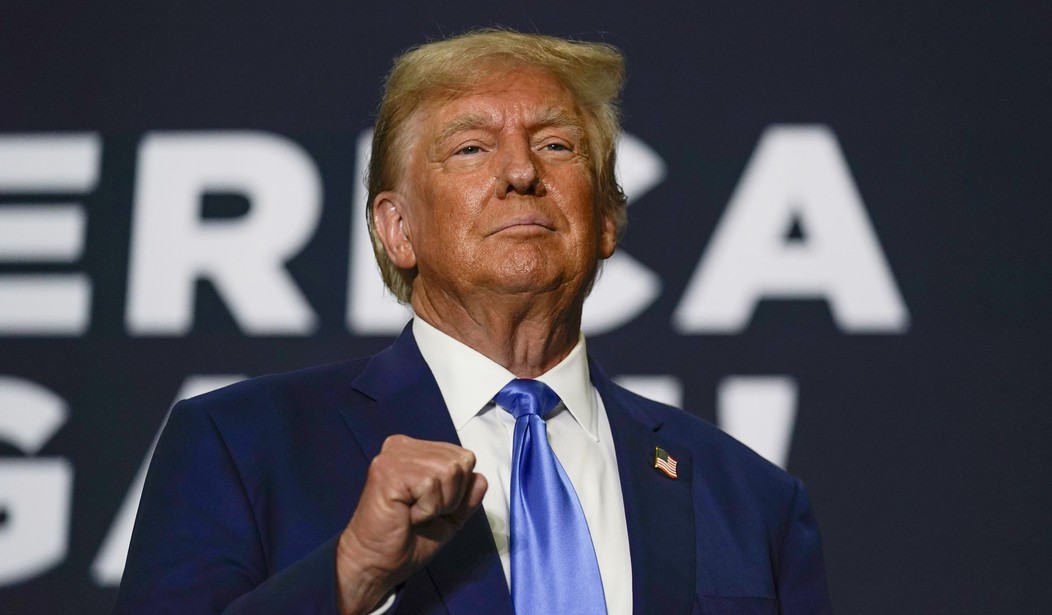Is it inevitable that Donald Trump will be the second person in history -- Richard Nixon was the first -- to win the Republican Party's nomination for president three times? Many thoughtful observers, and others as well, think so.
They have some solid evidence. Polling has been showing majorities of Republicans favoring Trump since Manhattan District Attorney Alvin Bragg indicted him March 30 on charges that seemed both trivial and invalid. The day before that, Trump led Gov. Ron DeSantis (R-Fla.) by just 44%-29% in the RealClearPolitics average. By April 6, Trump's lead rose to 51%-25% and 54%-22% on April 19.
Trump's national numbers have risen slowly since, while DeSantis' have sagged. If current numbers hold up, it may be that Bragg, elected after leading a June 2021 Democratic primary by just 8,828 votes, will have propelled Trump to another term in the White House.
But will the polling hold up? I think there's a possibility -- not a certainty, not a probability but a possibility -- that it won't. Evidence comes from the Oct. 22-26 NBC News-Des Moines Register poll of potential Republican caucusgoers in Iowa. Des Moines Register pollster J. Ann Selzer's record of accuracy, and in particular of spotting shifts in voter opinion, commands respect and attention.
Like other recent polls of early-voting Iowa and New Hampshire, this poll showed Trump below 50%, at 43% of the vote. The big headline was that former U.N. Ambassador Nikki Haley jumped into second place, tied at 16% with DeSantis. This follows her jump into second place in New Hampshire last month.
Taken together, in the Des Moines Register poll, Haley, DeSantis and fourth-place Sen. Tim Scott (R-S.C.) have 39%, just below Trump's 43%. But winnowing down the field won't necessarily mean that all the non-Trump votes go to his opponents, as my Washington Examiner colleagues Tim Carney and Byron York note.
Recommended
As Carney points out, when the Des Moines Register poll asked voters for their second choices, nearly half, 41%, of DeSantis voters said Trump. So a DeSantis withdrawal would put the former president at around 50%, far ahead of Haley.
And as York points out, only 19% of Haley's voters, about 3% of the total, say they're "very enthusiastic" about supporting her. She may have momentum, but the ratio of those favorable to those unfavorable about her (59%-29%) is behind not only Trump's (66%-32%) but also DeSantis' (69%-26%).
But this static analysis doesn't take into account other possible dynamic effects. Some 37% of Trump supporters say their minds aren't made up, which suggests a floor for Trump of 27% -- a beatable number, as National Review's Rich Lowry notes.
And when you aggregate the first-choice and second-choice votes, plus those who are saying they are actively considering DeSantis, his total comes out to 69%, actually a tick more than Trump's 67%. The corresponding number for Haley is 55%, suggesting either lower name identification or some resistance on the part of Trump voters and thus a lower potential ceiling.
The history of presidential caucus and primary voting is full of examples of large numbers of voters changing their minds in very short periods of time. Those who insist that current poll numbers will hold fast seem to be ignoring those examples.
The most vivid example in my mind is the Iowa Democratic caucuses in 2004. Vermont Gov. Howard Dean, brandishing his consistent opposition to military engagement in Iraq, had built up a strong lead -- and in a state with a heritage of dovish/isolationist/pacifist leanings.
He was well organized, too, and I remember watching the hordes of orange-stocking-capped Dean volunteers buzzing around Des Moines on caucus day. But the big news that night was a big victory for John Kerry, who had voted for the Iraq War. Very large numbers of voters, in a thought process I'm not sure anyone fully understood, just changed their minds.
Something similar could conceivably happen in Iowa next year's Republican contest. Large numbers of Trump voters could decide, for reasons not yet apparent, to switch to DeSantis or to Haley. Sure, Trump voters surely are more attached to him than Dean voters were to their candidate in 2004, but there's no big difference this time on an issue as prominent as Iraq was back then.
Will something like this happen? Unlikely, I think, and maybe the wish is the father of the thought. But I think it's possible. The alternative, given President Joe Biden's flagging numbers, is that the Manhattan district attorney will have paved the way for Trump to become the 47th president of the United States.
























Join the conversation as a VIP Member